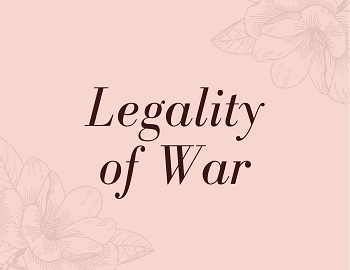Legality of War:
If the question under reference is to be answered purely from the point of view of commonsense it would seem in the very first instance that a thing like war which is responsible for unnecessary bloodshed, human crucification, and destruction cannot by any stretch of imagination be legal. However, if the question is analyzed further it seems clear that war is such an illegal act as cannot be completely wiped out. Since time immemorial man has resorted to war for the purpose of solving his problems, and despite various efforts to contain war, the states have often resorted to war.
As a result, various authors on International Law have tried to draw a margin line between a just war and an unjust war. Grotius declared that an unjust war could never be justified under International Law. War by a country to acquire more territory by force is an instance of an illegal or unjust war. The Covenant of the League of Nations placed restrictions on states for the purpose of resorting to war. The Covenant provided for the settlement of international disputes by peaceful means through arbitration or judicial settlement. If the parties were not satisfied by the decision they could resort to war after the expiry of three months from the decision. Similarly, the Charter of the United Nations prohibits a war though Article 51 of the Charter provides for self-defense in case of an armed attack. But such defensive action is tenable only so long as the Security Council does not take necessary steps towards the same. It reserves with Security Council full authority in this regard.
An international act of aggression has been held to be illegal in International Law. The judgments delivered at Nuremberg and Tokyo trials also clearly enunciate the point mentioned above. These judgments have gone ahead in holding the individual responsibility of those persons who are guilty of acts of planning, preparing, initiating, or waging a war of aggression or a war that violates an international treaty. Much has been said about these judgments. The real difficulty lies in the determination of facts as to when a war can be said to be aggressive. Every state which indulges in war calls the other state an aggressor and defends its own action as a measure of self-defence and it becomes very difficult to judge as to which state is the aggressor. Now under the provisions of the Charter of the United Nations, this task has been entrusted to the Security Council to judge the aggressor. Now under the circumstances, once the United Nations is capable of enforcing the judgments of like nature passed by the Security Council it is bound to eradicate the evil of war to a big extent.









Comments (No)